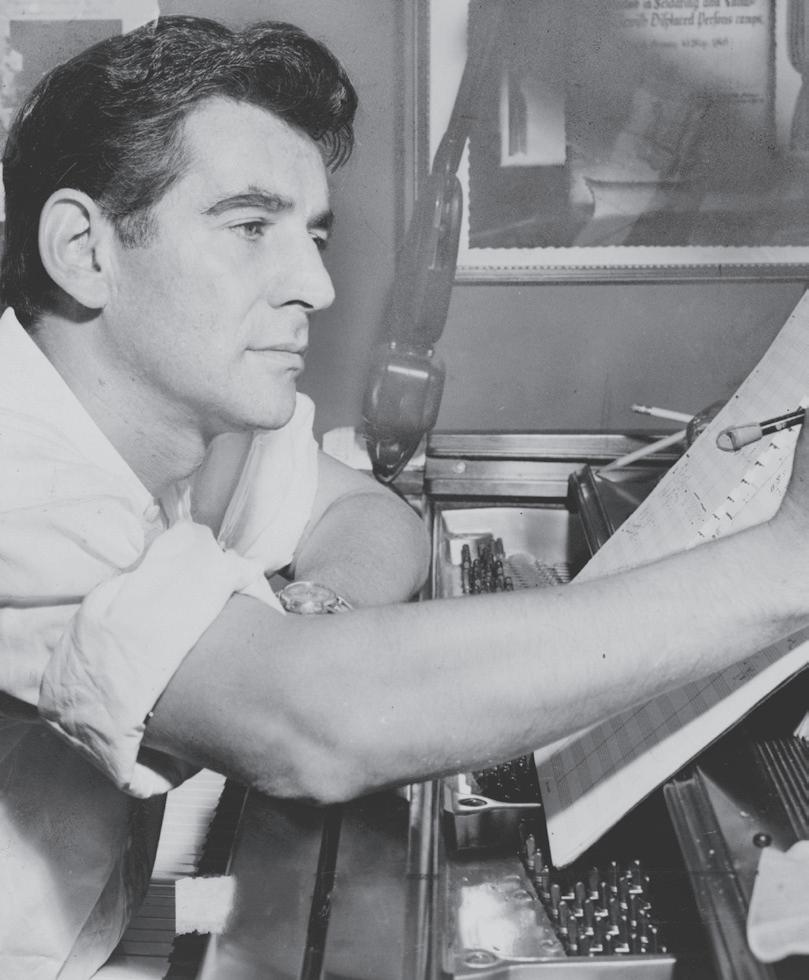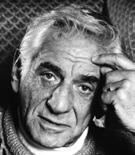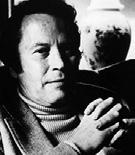

Message from Wayne S. Brown Message from Stephen Lord

We are delighted to return to both the Macomb and Berman Centers for the Performing Arts for our production of Candide. This production builds upon our five-year partnership with the Macomb Center for the Performing Arts, following productions of Frida, The Tender Land, Little Women and 27. This production at the Berman Center, founded by former MOT Trustees Bill and Madeleine Berman, marks our first since our 2015 production of Frida.
Community is at the foundation of our goals at MOT. While we are proud of our elegant Detroit Opera House, it is also important for us to bring opera to venues outside of our theater and to reach audiences across the region. Opera is an incredible art form, and making it more easily accessible to those who wish to experience it is important to us.
This production features members of our MOT Studio Young Artist Program, representing some of the best up-and-coming talent in the industry. The program was launched in 2015 with a major grant from the William Davidson Foundation, which has been generous in its continued support for MOT. The Foundation recently announced a $4 million grant to MOT that will contribute to community outreach, educational programming and facility improvements. We are grateful for our long-term partnership with the Davidson Foundation as we continue to bring world-class opera and dance to the region.
We also thank General Motors, our 2019 Spring Opera Sponsor, and the Andrew W. Mellon Foundation for sponsoring this production and for their ongoing support of MOT.
Following Candide, our 2018-19 opera series continues with Hansel and Gretel (April 6-14) and The Grapes of Wrath (May 11-19). We hope you will join us for future performances at our historic Detroit Opera House.
Candide has been a great old friend for me. I have conducted it at least four different times, and it has always been a moving experience. There are a great number of comic elements in it, but, in the end, it is full of heart and humanity.
Based on the novella by Voltaire, Candide is a satire, challenging the concept of optimism as its characters face the most difficult aspects of humanity, including war, murder, theft, illness and natural disaster. But when you pair those dire concepts with Leonard Bernstein’s incredible score — with musical gems including “Glitter and Be Gay,” “Make Our Garden Grow” and “You Were Dead, You Know” – you get a hilarious performance that keeps you laughing while still making you think.
We are also presenting Candide in honor of Bernstein, whose centenary was marked last August. With works like West Side Story and On the Town, Bernstein’s contributions to musical theater, especially, are enormous. In Candide, he toes the line of musical theater with bright upbeat music in a style that includes higher notes, more expansive ranges and a significant amount of vocal gymnastics.
And our Michigan Opera Theatre Studio Artists are more than up for the challenge. These young artists are some of the best up-and-coming talent in the industry. Our Candide, tenor Michael Day, has sung in numerous MOT productions including Eugene Onegin, Tosca, 27 and The Marriage of Figaro and will perform Al Joad in our upcoming production of The Grapes of Wrath. Our resident baritone Harry Greenleaf has been performing with MOT productions the longest with The Barber of Seville, Eugene Onegin, 27, Tosca, Rigoletto, Cyrano, The Girl of the Golden West, Carmen and The Tender Land, under his belt.
Wayne S. Brown President and CEO, Michigan Opera Theatre
We welcome our soprano Cheyanne Coss (Paquette), mezzo-soprano Katherine DeYoung (Old Lady) and Allen Michael Jones (Maximilian) who are making their MOT debuts this season and will be featured in today’s performance. We also welcome back last year’s resident soprano Monica Dewey who has returned to MOT to perform Cunegonde. And we welcome the debut of Maestro Daniel Black, originally an assistant conductor for Rigoletto and The Marriage of Figaro at MOT under the auspices of the Solti Foundation for conductors.
We invite you to relax and enjoy today’s performance and be on the lookout for the exciting careers ahead of these young performers!
Stephen Lord Principal Conductor, Michigan Opera Theatre
Message from William Wood Message from Elaine (Hendriks) Smith
Being a leader in the arts for southeast Michigan, The Macomb Center for the Performing Arts is committed to providing meaningful arts experiences that educate, enrich our lives and enhance our community as well as entertain us. Today we share our stage with Michigan Opera Theatre, because they share that commitment.
We are proud to partner with one of the region’s premier opera companies on these performances of Candide and celebrate the centenary of the great American composer Leonard Bernstein
Some say that Candide is an operetta and some a Broadway musical. Whatever you call it, it is a quintessential piece of American music that helped establish a sound that is distinctly American and distinctly Bernstein. Since its premiere on Broadway in 1956, it has played in theatres, music halls and opera houses around the world and has become one of Bernstein’s most beloved works. We are thrilled to have it onstage at the Macomb Center.
Our collaborations with community partners like MOT are vital to insuring a strong and dynamic cultural community in this region. They insure that Macomb Community College is able to offer cultural and artistic diversity that is crucial for a vibrant community. It also allows us to bring world-class performers and performances to the people of Macomb County.
We appreciate you joining us for the production and your support of the Macomb Center and Macomb Community College.
William R. Wood Director of Cultural Affairs and Community Engagement Macomb Community College
COMMUNITY PARTNERSHIP
The Macomb Center for the Performing Arts (MacombCenter.com) is a community enrichment program of Macomb Community College dedicated to providing a diverse range of cultural enrichment experiences, and to inspire and encourage artistic expression through education, performance and volunteer opportunities. Hosting more than 100,000 visitors annually, the Macomb Center presents high-quality professional performances, offers educational outreach in the arts, provides a performance venue for community-based arts organizations, and, in partnership with the adjacent Lorenzo Cultural Center, creates unique opportunities for multifaceted cultural programming.
Welcome to The Berman Center for the Performing Arts, we hope you enjoy your time here at The Jewish Community Center of Metropolitan Detroit. We are thrilled you have joined us for a very special performance of Michigan Opera Theatre’s (MOT) Candide
When MOT President and CEO Wayne Brown and I sat down to talk about working together again after 2015’s wonderful production of Frida, I was excited to find he wanted to bring Candide here. I hope that you too will fall in love with this dazzling operetta that challenges one man’s search to find happiness. Composed by the legendary Leonard Bernstein, this operetta began as a novella by Voltaire and has seen many iterations throughout its life. It has captured the heart of many and has seen Broadway stages, directors, designers and performers whose accomplishments are stunning. So, when Wayne asked me if we could work together to bring it here, I couldn’t say yes fast enough.
The Berman Center for the Performing Arts was built in 2011 with a generous donation from Mandell “Bill” and Madeleine “Madge” Berman, who were also MOT Trustees. They supported our vision for our theater in creating a dynamic cultural center that not only presents its own season but works with artists and companies from Detroit to showcase Michigan’s extraordinary performing artists and organizations. Bill and Madge assisted us in creating lasting partnerships with organizations like MOT, a partnership that is still going strong, and we are grateful for their leadership and support. It’s with great pride that we are part of the presentation of Candide at The Berman. We look forward to this and many more successful partnerships with MOT.
Elaine (Hendriks) Smith Senior Director, The Berman Center for the Performing Arts Jewish Community Center of Metropolitan Detroit
INSIDE CANDIDE: VOLTAIRE’S ATTACK ON OPTIMISM
By Erica HobbsMichigan Opera Theatre Studio Overview
Thefive resident artists of the Michigan Opera Theatre Studio represent some of the most exciting emerging talent in opera today. Coming to Detroit from all different areas of the country, from September to June these young opera professionals gain valuable experience through myriad performance opportunities in mainstage and community productions and regional outreach presentations. Throughout their one or two-year residency, Studio Artists benefit from advanced individual training and guidance from MOT’s Director of Resident Artist Programs, American tenor, Richard Leech, and Principal Coach/ Accompanist, Tessa Hartle, and hone their skills through master classes and instruction from an array of world class professionals, guest artists and
RICHARD LEECH Director of Resident Artist Programs
coaches.
In its fourth year, supported by a major grant from the William Davidson Foundation, the program serves as a central component of MOT’s enhanced presence in the community through our productions in the Detroit Opera House, community venues and through recitals and special events. An important and unique element of the program is that MOT’s community initiative productions are now selected and mounted specifically for the Studio Program. This season, with Studio Artists filling the leading roles, Leonard Bernstein’s Candide and Gian Carlo Menotti’s Amahl and the Night Visitors represent MOT’s fifth consecutive season of producing opera in community venues.

Voltaire’s comedic work Candide has been a long-time favorite for opera and musical theater fans alike. Composed by Leonard Bernstein, whose centenary was marked in August, the music straddles the line between the two genres. Like his other works including West Side Story and On the Town, the music is bright and upbeat, though in a style that explores the limits of the human voice with higher notes, more expansive ranges and a significant amount of vocal gymnastics.
But beneath its shiny surface is a satire that challenges the concept of optimism and tests the limits of “looking on the bright side.”
“The notion that everything was for the best, no matter what evils and tragedies befell a community, was preposterous to Voltaire,” said Candide Director Keturah Stickann. “So he employed a wide-eyed Everyman — Candide — to go from tragedy to tragedy until he came to the same conclusion.”
elements in it, but, in the end, it is full of heart and humanity,” said Michigan Opera Theatre Principal Conductor Stephen Lord. “We - performers and audience alike - learn a tremendous amount about the human condition with some laughs and tears along the way.”
The work premiered in 1956 with Bernstein seeing parallels in the story between 20th-century problems and those of Voltaire’s time 200 years prior.
“Voltaire’s satire is international,” he wrote in a 1956 article in the New York Times. “It throws light on all the dark places…Puritanical snobbery, phony moralism, inquisitorial attacks on the individual, brave-new-world optimism, essential superiority — aren’t these all charges leveled against American society by our best thinkers? And they are also the charges made by Voltaire against his own society.”

Despite the heaviness of the material, the tone of Candide is anything but. With musical gems like “You Were Dead You Know,” “Make Our Garden Grow” and “Glitter and Be Gay,” the songs continuously poke fun at the dire circumstances of the story, challenging the characters to keep their chins up as the world falls apart around them.
tenor Richard Leech is one of the most celebrated tenors of his generation. From the Met to Vienna and Carnegie Hall to the Hollywood Bowl, for more than three decades he made his home on the stages of the world’s great opera houses and symphonies. Also on the voice/opera faculty of Rutgers University though 2018, he recently began as visiting faculty for the University of Michigan. His leadership role with the MOT Studio allows Mr. Leech to utilize all aspects of his broad experience as he oversees the development of some of opera’s most exciting emerging artists and brings their performances to our stage and into our community.

American
The plot follows the life of the young man and a cast of characters that includes his love interest Cunégonde, his foe Maximilian, the maid Paquette and their professor Doctor Pangloss, who teaches them that this world is the best of all possible worlds as it is the only world we have.
But within the course of two hours, the characters face, in no short order: war, murder, rape, theft, illness and natural disaster. It also features the constant resurrection of its cast, who never stay dead despite repeated attempts to kill them.
“There are a great number of comic
“Candide travels the world, experiences so much pain, fear and loss, and in the midst of it all, is continually reunited with his love,” Stickann said. “In the end, he rejects both optimism and pessimism for a more measured view of the world and his (our) place in it. This is the central theme of the piece: finding that balance means starting at home.”
–
March 10 – 2:30 PM
Macomb Center for the Performing Arts
Sat., March 16 – 7:30 PM
Sun., March 17 – 2:30 PM
Berman Center for the Performing Arts
CANDIDE
THE ROYAL NATIONAL THEATRE VERSION
Music by LEONARD BERNSTEIN

Book Adapted from Voltaire by HUGH WHEELER
In a New Version by JOHN CAIRD
Lyrics by RICHARD WILBUR
Additional lyrics by STEPHEN SONDHEIM, JOHN LATOUCHE, LILLIAN HELLMAN, DOROTHY PARKER and LEONARD BERNSTEIN
WORLD PREMIERE
Chelsea Theater Center, Brooklyn Academy of Music – Brooklyn, New York December 19, 1973
CONDUCTOR
Daniel Black DIRECTOR
Keturah Stickann CHORUS MASTER
Suzanne Mallare Acton
LIGHTING DESIGN
James Sale
WIG & MAKEUP DESIGN
Joanne Weaver
ASSISTANT CONDUCTOR
Tessa Hartle
CAST
Voltaire: Richard Marlatt
Candide: Michael Day*
Cunegonde: Monica Dewey
Dr. Pangloss/King Hermann: Harry Greenleaf*
STAGE MANAGER
Ken Saltzman
Maximillian/ French Officer/Sailor/Immigrant/Senore/King Ivan: Allen Michael Jones*
Paquette/Immigrant: Cheyanne Coss*
Old Lady: Katherine DeYoung*
King of El Dorado/Inquisitor/Crony/James’ Assistant/ Rowing Prisoner/King
Stanislas/Chorus: Paolo Pacheco
Martin/Baron/James the Anabaptist/ Drill Sergeant/King Achmed/Chorus: David Moan
Grand Inquisitor/Vanderdendur/Corporal in Bavarian Army/ Rowing Prisoner/King Charles/Chorus: Seth Johnson
Cacambo/Guitar-Playing Senore/Captain in the Bavarian Army/ Don Issacar/King Theo/Chorus: Fred Buchalter
Governor/Inquisitor/Crony /King of Bavaria/Viennese Ambassador, Rowing
Prisoner/Chorus: Matthew Konopacki
Bavarian Infantry Man/Slave with No Limbs/ Drummer/Minister/ Undercover Man from Inquisition/Chorus: Brandon Motz
Queen of El Dorado/Crony/Dancer/Bavarian Infantry Man/Galley Captain/ Chorus: Kristina Reigle
Baroness/Crony/Dancer/El Dorado Sheep/Bavarian Infantry Man/Rowing
Prisoner/Chorus: Sandra Periord
*Michigan Opera Theatre Studio Artist
SYNOPSIS
Candide
ACT 1
The chorus welcomes everyone to Westphalia (“Westphalia Chorale”) and Voltaire begins to narrate his story. Candide, the illegitimate nephew of Baron Thunder-ten-Tronck, lives in the Baron’s castle Schloss Thunder-tenTronck. He is snubbed by the Baroness and bullied by her son Maximilian. Paquette, a very accommodating serving girl, also lives in the castle. However, Candide is in love with Cunegonde, the Baroness’s daughter as Maximilian, Candide, Cunegonde and Paquette find their happiness in life (“Life is Happiness Indeed”). The four discover that Dr. Pangloss, a man thought to be the world’s greatest philosopher, has taught them happiness (“The Best of All Possible Worlds”). The philosopher asks his four students to summarize what they have learned (“Universal Good”).
When Cunegonde spies Dr. Pangloss being physically intimate with Paquette, he explains it away as being a “physical experiment” and she decides to share the “experiment” with Candide. Professing their love to each other at a park, Candide and Cunegonde dream of what married life would look like (“Oh, Happy We”). The Baron, however, is angered at what Candide has done to Cunegonde, as he is a social inferior. Candide is promptly exiled, wandering alone with his faith and optimism to cling to (“It Must Be So”). He is then shanghaied by and into the Bulgar Army, which plots to “liberate” all of Westphalia. His escape attempt fails, and he is recaptured by the Army. The Bulgar Army attacks Schloss Thunderten-Tronck and in the castle the Baron’s family prays as the chorus joins in (“Westphalia”). However, the Baron, the Baroness, Maximilian, Paquette, Pangloss and (after being repeatedly ravished by the Bulgar Army) Cunegonde are all killed in the attack (“Battle Music”). Candide returns to the castle’s ruins and
searches for Cunegonde (“Candide’s Lament”).
Some time later, Candide becomes a beggar. He gives the last of his coins to Pangloss, who reveals that he was revived by an anatomist’s scalpel. He then tells Candide of his syphilis, a condition brought on by Paquette (“Dear Boy”). A merchant offers the two employment before sailing off to Lisbon, Portugal. However, as they arrive, a volcano erupts and the ensuing earthquake results in the death of 30,000 people. Pangloss and Candide are blamed for the disaster, arrested as heretics and publicly tortured by order of the Grand Inquisitor. Pangloss is hanged and Candide is flogged (“Autoda-Fé”). Candide eventually ends up in Paris, France, where Cunegonde shares her favors (on different mutually-agreedupon days of the week) with wealthy Jew Don Issachar and the city’s Cardinal Archbishop (“The Paris Waltz”). She contemplates what she has done to survive while in Paris (“Glitter and Be Gay”). Candide finds Cunegonde and reunites with her (“You Were Dead, You Know”). However, the Old Lady, Cunegonde’s companion, forewarns Cunegonde and Candide of Issachar and the Archbishop’s arrival. Candide inadvertently kills both of them by stabbing them with a sword.
The three flee to Cadiz, Spain with Cunegonde’s jewels, where the Old Lady tells Candide and Cunegonde about her past. The jewels are stolen and the Old Lady offers to sing for their dinner (“I Am Easily Assimilated”). The French police arrive, intending to arrest Candide for murdering Don Issachar and the Archbishop. Accepting an offer to fight for the Jesuits in South America, Candide decides to take Cunegonde and the Old Lady to the New World, and the three begin their journey on a ship (“Quartet Finale”).
ACT 2
In Montevideo, Uruguay, Maximilian and Paquette, now revived and disguised as slave girls, reunite. Soon after, Don Fernando d’Ibaraa y Figueroa y Mascarenes y Lampourdos y Souza, the governor of the city, falls in love with Maximilian, but quickly realizes his mistake and sells him to a priest. Meanwhile, Candide, Cunegonde and the Old Lady also arrive in Montevideo, where the Governor falls in love with Cunegonde (“My Love”). The Old Lady convinces Cunegonde that her marriage to the governor will support her financially (“We Are Women”). Candide soon befriends Cacambo and accepts him as his valet. Convinced by the Old Lady that the police are still after Candide for the Archbishop’s murder, Candide and Cacambo flee Montevideo and eventually stumble upon a Jesuit camp and are joined by the Father and Mother Superiors (“The Pilgrims’ Procession – Alleluia”). Candide soon discovers that the Mother Superior is actually Paquette and the Father Superior is Maximilian. When Candide tells Maximilian that he will marry Cunegonde, however, Maximilian angrily challenges him to a fight. However, Maximilian is once again inadvertently stabbed to death by Candide. Candide is forced to flee into the jungle as a result.
Three years later, Cunegonde and the Old Lady discuss the miseries shared by the upper classes while the Governor doesn’t want to hear their complaints (“Quiet”). Meanwhile, Candide and Cacambo are starving and lost in the jungles. Finding a boat in the ocean, they float downriver into a cavern for 24 hours until they finally reach Eldorado, the city of gold (“Introduction to Eldorado”). The two discover that the locals worship one god as opposed to three, palaces of science, rosewater and stones with cinnamon and clove scents. Dissatisfied without Cunegonde, Candide decides to leave. The locals think him foolish, but offer to help, giving
him some of the town’s golden sheep and constructing a lift that will guide him, Cacambo and the sheep over the mountain (“The Ballad of Eldorado”). One by one, the sheep die until only two remain. Unwilling to go back to Montevideo, Candide gives Cacambo one of the golden sheep to ransom Cunegonde, telling them that they will meet again in Venice, Italy.
Arriving at Suriname, Candide meets Martin, a local pessimist. He shows him a slave with one hand and one foot lost while harvesting sugar-cane, which is the result of Europeans eating sugar; Candide is unable to convince Martin otherwise (“Words, Words, Words”). Vanderdendur, a Dutch villain, offers his ship, the Santa Rosalia, in exchange for the golden sheep. Candide is excited when he is told that the Santa Rosalia is to depart for Venice. The locals and Vandendur wish Candide a safe journey to Venice (“Bon Voyage”). However, the ship sinks and Martin drowns as a result. After reuniting with his golden sheep, Candide is picked up by a galley, meeting five deposed kings. The galley is rowed by slaves, including Pangloss, revived once again. The kings say that they will live humbly, serving both god and men, and Pangloss leads their debate (“The Kings’ Barcarolle”).
The ship arrives in Venice, where the Carnival festival is taking place (“Money, Money, Money”). While the kings play roulette and baccarat, Candide searches for Cunegonde. Maximilian, revived once again, is now the corrupt Prefect of Police and the town’s leader. Paquette is now the town’s reigning prostitute. Cunegonde and the Old Lady are employed to encourage the gamblers (“What’s the Use?”). Pangloss celebrates a victory after winning roulette and spends his money on the other ladies (“The Venice Gavotte”). Candide, however, masked for the Carnival, is accosted by Cunegonde and the Old Lady (both of whom are also masked), who try to swindle him out of
his money. During the exchange, all the masks come off and they are horrified to recognize each other. Seeing what Cunegonde has become, Candide’s image of and belief in her is shattered (“Nothing More Than This”). Candide does not speak for several days; with
CREATOR PROFILES
Leonard Bernstein (Music)

Leonard Bernstein was a worldrenowned musician throughout his entire adult life. He was a conductor, composer, author, music lecturer and pianist. He served as Music Director of the New York Philharmonic and conducted the world’s major orchestras, recording hundreds of performances. His books and the televised Young People’s Concerts with the New York Philharmonic established him as a leading educator. His numerous compositions include Jeremiah, The Age of Anxiety, Kaddish, Serenade, Five Anniversaries, Mass, Chichester Psalms, Slava!, Songfest, Divertimento for Orchestra, Missa Brevis, Arias and Barcarolles, Concerto for Orchestra and A Quiet Place. He also composed for the Broadway musical stage, creating masterpieces such as On the Town, Wonderful Town, Candide and the immensely popular West Side Story. In addition to the West Side Story collaboration, Bernstein worked with choreographer Jerome Robbins on three major ballets, Fancy Free, Facsimile and Dybbuk. Bernstein was the recipient of many honors, including two Tony Awards for Distinguished Achievement in the Theater and for the Best Musical, 11 Emmy awards, the Lifetime Achievement Grammy Award, The Praemium Imperiale and the Kennedy Center Honors . (Courtesy of Boosey & Hawkes)
what little money they have left, they purchase a small farm outside Venice and the chorus says that life is just life and paradise is nothing (“Universal Good”). Candide finally speaks and resolves to marry Cunegonde (“Make Our Garden Grow”).
Hugh Wheeler (Book)
Hugh Wheeler was a novelist, playwright and screen writer. He wrote more than 30 mystery novels under the pseudonyms Q. Patrick and Patrick Quentin, and four of his novels were transformed into films: Black Widow, Man in the Net, The Green-Eyed Monster and The Man with Two Wives. For films he wrote the screenplays for Travels with My Aunt, Something for Everyone, A Little Night Music and Nijinsky. His plays include Big Fish, Little Fish (1961), Look: We’ve Come Through (1961) and We Have Always Lived in the Castle (1966, adapted from the Shirley Jackson novel), he co-authored with Joseph Stein the book for a new production of the 1919 musical Irene (1973), wrote the books for A Little Night Music (1973), a new production of Candide (1973), Sweeney Todd, the Demon Barber of Fleet Street (1979, based on a version of the play by Christopher Bond) and Meet Me in St. Louis (adapted from the 1949 MGM musical). He received Tony and Drama Desk Awards for A Little Night Music, Candide and Sweeney Todd
Richard Wilbur (Lyrics)

Richard Wilbur was an American poet and literary translator. One of the foremost poets of his generation, he published nine volumes of poetry throughout his career, including The Beautiful Changes, and Other Poems ; Things of this World; Advice to a Prophet

and other Poems and Walking to Sleep: New Poems and Translations. As a translator, Wilbur specialized in the 17th century French comedies of Molière and the dramas of Jean Racine. Wilbur was the recipient of many honors for his work, including Guggenheim Fellowships, the National Book Award for Poetry for Things of this World, the Pulitzer Prize for Poetry in 1957 and 1989 for Things of this World and New and Collected Poems, the New York Drama Critics’ Circle Award for Best Musical for Candide, the Drama Desk Special Award for translation of The Misanthrope and the United States Poet Laureate and the Laurence Olivier Award for Musical of the Year in 1988 for Candide. He also received the National Medal of Arts from President Clinton in 1994 and was inducted into the American Theater Hall of Fame in 2003. He was born on March 1, 1921 and died on October 14, 2017. (Courtesy University of Michigan)
ARTIST PROFILES
Suzanne Acton (Chorus Master)
Chorus Master Suzanne Mallare Acton has received wide acclaim for her choral direction involving more than 125 productions in seven languages. Conducting credits include West Side Story, The Music Man, Pirates of Penzance, The Mikado, Daughter of the Regiment, Carmen, La Traviata and Carmina Burana with The Medium for Michigan Opera Theatre; My Fair Lady and La Traviata for Dayton Opera; Merry Widow and Madama Butterfly for Artpark; and Tosca for Augusta Opera. As founding Director of

Music Theatre International Music Theatre International (MTI) is one of the world’s leading theatrical licensing agencies, granting theatres from around the world the rights to perform the greatest selection of musicals from Broadway and beyond. Founded in 1952 by composer Frank Loesser, and orchestrator Don Walker, MTI is a driving force in advancing musical theatre as a vibrant and engaging art form.
MTI works directly with the composers, lyricists and book writers of these musicals to provide official scripts, musical materials and dynamic theatrical resources to over 70,000 professional, community and school theatres in the US and in over 60 countries worldwide.
MTI is particularly dedicated to educational theatre and has created special collections to meet the needs of various types of performers and audiences. MTI’s Broadway Junior™ shows are 30- and 60-minute musicals for performance by elementary and middle school-aged performers, while MTI’s School Editions are musicals annotated for performance by high school students.
the MOT Children s Chorus, Ms. Acton was instrumental in developing the inaugural season. She is also the Artistic and Music Director of metro Detroit’s Rackham Choir.
Daniel Black (Conductor)
Canada-based American conductor Daniel Black has been hailed as a conductor who makes music in a way that is meaningful to audiences in the 21st century. In addition to conducting Candide with Michigan Opera Theatre, Daniel is the assistant conductor of

the Florida Orchestra, where he will conduct over 30 performances in 201819. Daniel also makes his debut with the Texarkana Symphony Orchestra in 2019. Prior engagements have included a three-year appointment as Associate Conductor of the Fort Worth Symphony Orchestra, during which he conducted over 150 performances, and guestconducting appearances with the San Antonio Symphony Orchestra, the Dnipro (Ukraine) State Opera and Ballet Company, the St. Petersburg (Russia) State Academic Symphony Orchestra, the Dallas Basically Beethoven Festival and the Wisconsin Chamber Orchestra, among others. Daniel has also served as Assistant Conductor on opera productions with Opera Theatre Saint. Louis, MOT and the Spoleto U.S.A. Festival. Daniel received Solti Foundation U.S. Career Assistance Awards in 2015, 2016 and 2018.
Alaina Brown (Westphalian, Venetian Woman)
Soprano Alaina Brown has been praised for her fine musicianship and exquisite coloratura. She has gained national and international recognition for her interpretations of Handel and Mozart and, most recently, her dramatic performance of “The Queen of the Night” from The Magic Flute. The Cincinnati Post named her as “The Young Artist to watch,” following her debut with the Cincinnati Opera as Frasquita in Carmen
Alaina is currently a cast member on the international tour of Porgy and Bess and recently made her debut in the role of Clara in several opera houses across Europe including Oper Hamburg and Frankfurt Oper. Past performances include Die Vertreter in Michigan Opera Theatre’s production of Elektra and as a guest soloist with the Dallas Symphony and the Orchestra Filarmonica Siciliana
in Palermo Italy. She will make her debut at the Teatro Regio Torino, Italy this summer.
Fred Buchalter (Cacambo)

As a longtime member of the Michigan Opera Theatre Chorus, Fred has performed in over 80 productions and is excited to be a part of the Candide ensemble. In addition to his chorus roles, he has also appeared at MOT as the Coroner in Porgy & Bess, the Emperor Altoum in Turandot and Ambrogio in The Barber of Seville. Fred is also active in the local theatre community having performed at Greenfield Village, Jewish Ensemble Theatre, Williamston Theatre, Meadowbrook Theatre and others.

Claire Chardon (Westphalian, Venetian Woman)
As a Grand Rapids native, Claire Chardon has established herself as a versatile artist on the operatic, musical theater and concert stage. Most recently, she has performed around the Detroit area with the Michigan Opera Theater Chorus, Opera MODO and the Ann Arbor Festival of Song. Some favorite recent roles include Adele (Die Fledermaus), Despina (Cosí fan tutte), and Clara (Light in the Piazza). Claire earned her Bachelor of Music degree from Grand Valley State University and her master’s degree from Bowling Green State University.
Cheyanne Coss (Paquette)
As the Michigan Opera Theatre Studio soprano, Cheyanne Coss will perform this season as the Dew Fairy in the Michigan Opera Theatre’s production of Hansel and Gretel. She is a graduate of the New England Conservatory



of Music and recently made her San Francisco debut in the role of Aminta in The Shepherd King with the Merola Opera Program. Cheyanne has also performed with Chautauqua Opera, Charleston Symphony Orchestra and Opera Theatre of Saint Louis. She has won several competitions, including First Place in the William C. Byrd Young Artist Competition, the David Daniels Young Artist Competition and second place in the FAVA Grand Concours Competition. This season, Cheyanne makes her debut as Pamina in The Magic Flute with Opera Grand Rapids and Toledo Opera. She hails from Eaton Rapids, Michigan and is a proud alumna of Oakland University.
Michael Day (Candide)
Michael Day is the resident tenor for the Michigan Opera Theatre Studio. This season, he performs the title role in Candide as well as a peasant in Eugene Onegin and Al Joad in The Grapes of Wrath with Michigan Opera Theatre. Last season, he sang Spoletta in Tosca, Pablo Picasso and F. Scott Fitzgerald in 27 and Don Basilio in The Marriage of Figaro with MOT. Recently, Michael performed the role of Leo Hubbard in Regina with Opera Theatre of Saint Louis. His performance credits also include Indiana University Opera Theatre, Indianapolis Pro Musica, Bloomington Chamber Singers and Utah Festival Opera. Michael is a twotime Metropolitan Opera National Council District Winner and winner of the Indianapolis Matinee Musicale Competition. He holds a bachelor’s degree in Music Education and Vocal Performance as well as a master’s degree in Voice from Indiana University.
Monica Dewey (Cunegonde)
Atlanta native Monica Dewey is a former Michigan Opera Theatre Studio Artist. Last season, she performed Alice in MOT’s production of 27 and made her San Francisco Opera debut as Poussette in Manon. Other notable roles include Servilia in Titus and Alexandra Giddens in Regina with the Opera Theatre of Saint Louis. Her awards include first place at the 2017 Hilde Zadek International Voice Competition in Vienna, second place at the 2016 Central Region of the Metropolitan Opera National Council Auditions and a 2017 Sullivan Foundation Award. She has been a young artist with Chautauqua Voice Institute, Lyric Opera Studio Weimar and Harrower Opera Workshop. She received her Master of Music degree from Indiana University’s Jacobs School of Music and a dual bachelor’s degree in Music and Arts Administration from the University of Kentucky.

Katherine DeYoung (Old Lady)
Traverse City, Michigan native Katherine DeYoung joins the Michigan Opera Theatre Studio as its resident mezzosoprano. Her Michigan Opera Theatre roles this season include Olga (cover) in Eugene Onegin, Old Lady in Candide, Sandman in Hansel and Gretel and Ma Joad (cover) in The Grapes of Wrath.
Last summer, she performed as an apprentice with Santa Fe Opera. She also recently completed her master’s degree at the University of Houston where she performed Isabella in The Italian Girl in Algiers, Gertrude in Romeo and Juliet and Elizabeth Proctor in The Crucible. Her favorite role performed is the title role in Carmen with Opera in the Ozarks. Katherine is a District Winner of the 2018 Metropolitan

Opera National Council Auditions and is an alumna of Michigan State University.

Harry Greenleaf (Dr. Pangloss)
Wixom, Michigan native Harry Greenleaf is the resident baritone of the Michigan Opera Theatre Studio. This season, he performs the Captain and covers the title role in Eugene Onegin and performs the roles of Fiorello and Sergeant in The Barber of Seville. He also performs Dr. Pangloss in Candide, covers the father in Hansel and Gretel and sings Connie Rivers in The Grapes of Wrath with MOT. Previous MOT credits include Leo Stein and Man Ray in 27, Sciarrone in Tosca, Marullo in Rigoletto, Le Bret in Cyrano, Jake Wallace in The Girl of the Golden West, Moralès in Carmen and Top in The Tender Land, a role he recently reprised with Des Moines Metro Opera. He has been a Studio Artist with the Wolf Trap Opera Company, an Apprentice Artist with Des Moines Metro Opera and a Young Artist with the Glimmerglass Festival. He holds a Master of Music degree from the University of Cincinnati College-Conservatory of Music and is an alumnus of the Michigan State University College of Music.

Seth Johnson (Grand Inquisitor)
Tenor Seth Johnson is from Pekin, Illinois. He is a graduate of Bradley University and a resident of Toledo, Ohio. Since moving to Ohio, Seth has been involved with many opera companies, including Great Lakes Light Opera, Toledo Opera and Cleveland Opera Theater, in addition to Michigan Opera Theatre. With these companies, he has appeared in Vanessa as the Young Pastor, The Summer King playing violin as a Mariachi, Clo-Clo as Von Marambot,
and most recently in Candide at Ohio Light Opera as Vanderdendur. Seth is excited for the opportunity to reprise the role of Vanderdendur with MOT. When he is not performing, Seth can be found teaching voice and piano at Forte Music School in Toledo or taking lessons with Micah Graber at the University of Toledo.
Allen Michael Jones (Maximilian)
Allen Michael Jones is the resident bass of the Michigan Opera Theatre Studio. This season, he performs Zaretsky in Eugene Onegin and Maximillian in Candide with Michigan Opera Theatre. A native of Atlanta, he received a master’s degree in Voice from Georgia State University. Previous roles include Sarastro in The Magic Flute, Balthazar in Amahl and the Night Visitors, Colline in La Bohème, Don Basilio in The Barber of Seville and Commendatore in Don Giovanni. In addition to singing, Allen Michael is a professional voice-over and radio artist.
Tessa Hartle (Assistant Conductor)
Tessa Hartle is in her third season as Principal Coach/Accompanist of the Michigan Opera Theatre Studio. She has previously worked for such companies as Opera Theatre of Saint Louis, Florida Grand Opera, Sarasota Opera, Des Moines Metro Opera, Virginia Opera, Aspen Opera Theater Center, UrbanArias, Opera North and Intermountain Opera Bozeman. Tessa has her master’s degree in Collaborative Piano from the University of Maryland and her bachelor’s degree in Piano Performance from the University of Michigan.
Matthew Konopacki (Governor)
Baritone Matthew Konopacki, a native of Livonia, Michigan, is an active performer of both classical and contemporary works. Equally comfortable on both the operatic and concert stage, his repertoire ranges from the cantatas of J.S. Bach, to the contemporary operatic music of Kevin Puts. With Michigan Opera Theatre, he has performed the roles of 1st Scottish Soldier in Puts’ Silent Night, Usciere in Verdi’s Rigoletto, as well as a part of featured ensembles in both David DiChiera’s Cyrano and Daniel Sonenberg’s The Summer King. He is also a featured singer on the recent release of DiChiera’s legacy album, “Letters & Fantasies,” on Innova Recordings. Matthew holds a master’s degree in Vocal Performance from the University of Houston and has appeared as a young artist with Pensacola Opera and the Janiec Opera Company. Current and future engagements include supporting roles in Leonard Bernstein’s Candide and Ricky Ian Gordon’s The Grapes of Wrath with MOT.
Richard Marlatt (Voltaire)
Richard Marlatt last appeared with Michigan Opera Theatre in Showboat at Fisher Theatre and has worked with various nearby theatres including: Tipping Point, Meadow Brook and Barn Theatre. Based in Chicago for many years, Richard worked as an actor and director there in countless theatres including: Ravinia Festival, Light Opera Works, Chicago Dramatists, Goodman, Paramount, Marriott Theatre, Provision, Drury Lane, Theatre At The Center and Shaw Chicago. Other Regional credits include performances with: Cincinnati Shakespeare, Madison Repertory,
Nebraska Shakespeare, Little Theatre
On The Square, Human Race Theatre, Nebraska Repertory, Peninsula Players and Actors Theatre of Louisville. Notable roles include Tito in A Comedy of Tenors, Mr. Banks in Mary Poppins and Mr. Pulitzer in Newsies as well as Ebenezer Scrooge, Hamlet, Falstaff, Don Quixote and Dracula. Richard also works as a director and appears in Independent Film. He trained at London’s Royal National Theatre and The National Shakespeare Conservatory in New York and has a Fine Arts degree as an Actor and Director.
David Moan (Martin)
David Moan is ecstatic to return to performing with Michigan. Originally from Pittsburgh, David received a bachelor’s degree in Vocal Performance from Manchester University before becoming a Detroit local in 2012. Previously, David has been seen around MOT as Edward G. Robinson and a Calveras in Frida, Mike in A View from the Bridge and St. Brioche in The Merry Widow, as well as countless productions as a member of the MOT Chorus. Other notable local credits include John Wilkes Booth in Assassins (Wilde Award Winning), Sweeney Todd in Sweeney Todd and Ash in Evil Dead: The Musical. David can be seen this May as Val in The Grapes of Wrath and this summer as God in An Act of God at The Dio Theatre in Pinckney, Michigan. David would like to thank his MOT family for this incredible opportunity, Monica for all the love and support and Batman for being the hero we should all strive to be.
Brandon Motz (Bavarian Infantry Man)
Tenor Brandon Motz is enjoying his second season with the Michigan Opera Theatre Chorus. He holds degrees from Otterbein University and Westminster Choir College where he performed





with the New York Philharmonic, Philadelphia Orchestra and the San Francisco Orchestra. He debuted as the Second Armored Man in The Magic Flute at Spoleto Festival USA. Favorite opera roles include Little Bat in Susannah, Beppe in Pagliacci and Frederick in Pirates of Penzance. Brandon also served as a liturgical cantor for Pope Francis’ visit to Philadelphia. Equally committed to education, he maintains a private studio and has been on the faculty of The CoOPERAtive Program in Princeton, New Jersey as a dramatic coach and acting teacher.
Paolo Pacheco (King of El Dorado)
A native of North Carolina, baritone Paolo Pacheco graduated from the University of North Carolina, Greensboro, where he studied with Robert Wells. Performance credits include Opera Carolina, the Brevard Music Festival and Greensboro Opera. An active singer in the Detroit area, Paolo has been a member of the Michigan Opera Theatre Chorus for more than five years. Recently, he performed in Rumpelstiltskin, composed by David DiChiera and Karen Vanderkloot DiChiera, touring schools throughout metropolitan Detroit. In 2016, he sang the role of the First French Soldier in MOT’s Silent Night. In addition to his operatic performances, Paolo has been featured as an oratorio soloist with Rackham Choir. He returns to the MOT stage in May to sing the roles of Joe and Pump Guy One in The Grapes of Wrath.
Sandra Periord (Baroness)
Hailing from Saline, Michigan, Sandra Periord is a graduate of the University of Michigan where she earned her Master of Music degree in Vocal Performance.



In 2016 Sandra won second place in the Metropolitan Opera National Council Great Lakes Regional Auditions. She was also named a finalist in the FAVA Grand Concours Competition, a Semi-finalist in the Montreal CzechSlovak International Vocal Competition and a Finalist in both the University of Michigan Concerto Competition as well as the Harold Haugh Light Opera Competition in 2015. Opera credits include; Gretel in Hansel and Gretel, Despina in Cosi Fan Tutte, Nella in Gianni Schicchi, La Fee in Cendrillon and Thi Mau in the world premiere of The Tale of Lady Thi Kinh. Sandra is a member of the Michigan Opera Theater Chorus. She earned her bachelor’s degree from the Jacob’s School of Music at Indiana University.
Kristina Riegle (Queen of El Dorado)
Kristina Riegle is quickly establishing herself as an exciting and engaging actor and singer. Originally from Connecticut, Kristina earned her Master of Music degree in Vocal Performance from the Boston Conservatory. Some of her favorite roles performed include Ruggiero ( Alcina), Dorabella (Così fan tutte), Cherubino (The Marriage of Figaro), Dorothée (Cendrillon), Jo March (Little Women), Mercédès (Carmen) and Desirée Armfeldt ( A Little Night Music). She has performed with The Kennedy Center, Washington National Opera, Resonance Works | Pittsburgh, St. Petersburg Opera, Flint Youth Theatre, the Encore Musical Theatre Company, Cape Cod Opera, Opera Providence, Fiddlehead Theatre Company, Boston Opera Collaborative and Opera Boston. She joined Michigan Opera Theatre last season in Tosca and The Summer King and returns this season in Amahl and the
Night Visitors, Candide and The Grapes of Wrath. She is a proud member of Actors’ Equity Association and American Guild of Musical Artists.
James Sale (Lighting Design)

James Sale has designed over 600 operas, plays, ballets and concerts over his career. He is very happy to be back at Michigan Opera Theatre where he has designed Turandot and The Magic Flute, in past seasons. James will be in Austin this spring to design La bohème for the Austin Opera. James is also the owner of JSL, Inc., which specializes in architectural lighting and lighting system design for residential and commercial settings.

Diane Schoff (Westphalian, Venetian Woman)
Diane Rae Schoff, mezzo-soprano, is a regular character on stage with Michigan Opera Theatre as well as regional companies around the country. Diane received high praise this past season in her company and role debuts with Opera Carolina and Opera Grand Rapids as Marcellina in their 2018 production of The Marriage of Figaro. Recent career highlights include the Old Baroness in Vanessa with Toledo Opera and Aunt Cecilia in Little Women, the Second Lady in The Magic Flute, the Second Maid in Elektra and Natalia Trotsky in Frida with MOT. She returns to Toledo Opera and Opera Grand Rapids this fall as the Third Lady in The Magic Flute and will return to Opera Carolina in their productions of The Daughter of the Regiment as the Duchess of Crackenthorpe and in Eugene Onegin as Larina. Diane sings at Grosse Pointe Memorial Church as soloist and section leader. She is a National Semifinalist in
the Metropolitan Opera Competition and is graduate of San Francisco Opera’s Merola apprentice program.


Keturah
Stickann (Director)
Keturah Stickann’s recent credits include It’s A Wonderful Life (San Francisco Opera), Pelléas et Mélisande (West Edge Opera), Norma (Opera Southwest), Orfeo ed Euridice (Florida Grand Opera), Turandot (San Diego Opera), Cold Mountain (North Carolina Opera), Lucia di Lammermoor (Opera Colorado), Don Quichotte (San Diego Opera), La traviata and Monteverdi’s Orfeo (both at Chautauqua Opera). She is a frequent collaborator with Leonard Foglia, working as his choreographer and associate on the world premieres of Moby Dick, and It’s A Wonderful Life, both by Jake Heggie and Gene Scheer, as well as Cold Mountain, Cruzar la Cara de la Luna and A Coffin In Egypt. Coming up, Keturah will direct Rusalka at Madison Opera, As One at Eugene Opera and Heggie and Scheer’s next world premiere, If I Were You, commissioned by the Merola Opera Program.

Joanne Weaver (Wig/Make-up Design)
Born in England, Joanne Weaver came to the United States in the late 1980s. She began apprenticing with what was then Washington Opera, now Washington National Opera. Ms. Weaver has since designed at many opera companies throughout the U.S., including Glimmerglass Opera, Central City Opera, Sarasota Opera, Lyric Opera of Kansas City and Des Moines Metro Opera. Her notable Michigan Opera Theatre credits include The Magic Flute, Macbeth, The Passenger, Frida, The Merry Widow, Faust, Margaret Garner, Cyrano and The Pearl Fishers.
Carol Ambrogio
Wood
(Westphalian, Venetian Woman)
Carol Ambrogio Wood, soprano, is frequently heard in recital, oratorio and opera. She was recently heard as ‘The Voice of Joan’ in Richard Einhorn’s Voices of Light at the Detroit Film Theatre with Rackham
Symphony Chorus and was a soprano soloist in Handel’s Messiah with the Fort Street Chorale. She has also sung the liturgical dramatic role of Mary in The Better Part at Grosse Pointe Memorial
Church, where she is a section leader and a soprano soloist.
Carol performed the role of the Second Spirit in The Magic Flute, which was her first professional role at Michigan Opera Theatre. She is a current chorus member at MOT and has sung over 15 different operas with the company. Other operatic roles include: Susanna in The Marriage of Figaro, Amy in Little Women and Nella and Lauretta in Gianni Schicchi. This April, she will perform as the soprano soloist with the Macomb Symphony Orchestra in A Midsummer Night’s Dream.
Michigan Opera Theatre Orchestra — Candide
VIOLIN I
Eliot Heaton, Concertmaster+
VIOLA
Scott Stefanko, Principal+
CELLO
Nadine Deleury, Principal+
BASS
Derek Weller, Principal+
FLUTE
Laura Larson, Acting Principal+
&EDUCATION COMMUNITY PROGRAMS
TOURING ENSEMBLE
Last season the Michigan Opera Theatre Touring Ensemble presented more than 70 performances to students, seniors and adults throughout the state of Michigan, bringing opera to over 17,000 individuals. Performances are 3060 minutes in length and include a Q&A session with the cast immediately following the production. Our 2019 touring season includes a variety of performances; call today to bring opera to your community!
I, Too, Sing America
By Chris Jakob with poetry by jessica Care moore (Grades 6-12)
OBOE
Sally Heffelfinger-Pituch, Acting Principal+

CLARINET
Brian Bowman, Principal+
BASSOON
Francisco Delgado, Principal+
HORN
Andrew Pelletier, Principal+
TRUMPET
David Ammer, Principal+
TROMBONE
David Jackson, Acting Principal
PERCUSSION
John Dorsey, Principal+
SYNTHESIZER
Tessa Hartle
+ Michigan Opera Theatre Core Orchestra
Detroit Federation of Musicians Local #5 American Federation of Musicians
Michigan Opera Theatre Chorus — Candide
Sopranos
Brandy Adams
Carol AmbrogioWoods
Alaina Brown
Claire Chardon
Sandra Periord
Kim Sanders
Altos
Andrea Apel
Yvonne Friday
Rachel Girty




Kristina Riegle
Diane Schoff
Chantel Woodard
Tenors
Fred Buchalter
Camron Gray
Richard Jackson, Jr.
Seth Johnson
Brandon Motz
David Roberts
Basses
Kurt Frank
Branden C.S.
Hood
Matthew Konopacki
David Moan
Paolo Pacheco
Kevin Starnes
This new multi-media performance incorporates video, live song, narrative and poetry to highlight the stories and achievements of African-American artists and athletes who defied limitations and paved the way for integration in their fields. (Subjects: American History, Humanities, English Language Arts, Arts Education – Music and Theatre)

Jack and the Beanstalk

Arranged by John Davies with compositions by Sir Arthur Sullivan (Grades K-6) When Jack sells the family cow to a mysterious man for a handful of beans, he has no idea what kind of adventure awaits him! When the beans take root and a magical stalk grows to the sky, Jack will discover a land of giants, a golden hen and an important lesson about treating other people with kindness. Michigan Opera Theatre’s new production sets the story in the ancient West African Mali Empire and tells the tale through music from the operettas of Sir Arthur Sullivan. This new twist on an old favorite is a must-see for children of all ages! (Subjects: World History, Humanities, English Language Arts, Arts Education — Music and Theatre)
ACK & THE EANSTALK JACK & THE BEANSTALK
OPERA & BROADWAY REVUES
From the American Songbook classics of Irving Berlin and Jerome Kern to the operatic favorites of Bizet, Puccini, and Verdi, our Opera & Broadway revues continue to delight audiences of all ages! A favorite in a variety of venues including schools, libraries, senior living communities, theaters and community centers.
To learn more about any of these programs e-mail ascobie@motopera.org.
1526 Broadway • Detroit, MI 48226
Box Office: 313.237.7464
Administration: 313.961.3500
michiganopera.org
